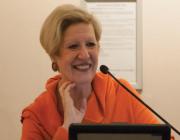Completed her undergraduate studies at the National and Kapodistrian University of Athens (NKUA), Greece, her postgraduate studies at Claremont Graduate School and at U.C.L.A. in the U.S.A., and her postdoctoral studies at the University of Cambridge, England. Involved with language education in Greece, she was responsible for the first and second extensive foreign language curricula reforms in the 80s and the 90s, while recently she led a team of language didactics experts in developing the Integrated Foreign Languages Curriculum (IFLC), which was adopted as the national foreign language core curriculum in 2016. She also directed the research team that designed the IFLC data base (Dendrinos & Gotsoulia 2015) and directed the national programme of English for Young Learners (2010-2014), on the basis of which English as a foreign language was introduced to pupils from the first year of primary school.
Interested in socially accountable applied linguistics, she has researched the discursive practices of English and English language teaching, critically analysed European language education policies, and explored ideological constructions in language policy texts and English as a foreign language teaching/learning materials. Her areas of expertise are language education politics, foreign language pedagogy, curriculum and materials development, language testing and assessment and mutli-/plurilingualism in education. Her published work, which appears in English and Greek but also in Portuguese and Spanish is mainly on language teaching, learning and assessment, and on intra- and cross-linguistic linguistic mediation practices. However, she has also published her work on a variety of social issues including the linguistic representations of poverty, of gender and of the environment, as well as on the construction of bureaucratic discourse.
Since 2002-2003 she has devoted much of her time to developing a multilingual examination suite that leads to the state certificate of language proficiency, known by its Greek acronym KPG. These exams – in English, French, German, Italian, Spanish and Turkish – are administered on a national level by the Greek Ministry of Education. She has also been involved in the development of the e-KPG platform which will contain automated services and a computer adaptive testing. Thousands of Greek learners take part in these exams every year and their scripts are the source for data feeding the KPG Corpus. Their performance has also provided ground for numerous research projects, some of which are presented in an edited collection (Karavas & Mitsikopoulou, Peter Lang 2018).
Since 2014-2015, she has been president of the European Civil Society Platform for Multilingualism (ECSPM), organising and supporting actions for multilingualism in European societies. The organisation’s membership has been growing steadily particularly with academic institutions joining the CURUM – a Cluster of University Research Units for Multilingualism. Its annual symposia, concerned with mutli-/plurilingualism especially in schools and universities, are hosted by different universities across Europe each year.
As of late she is Director of the newly founded Research Centre for Multilingualism and Language Policy of the NKUA, which will extend the work carried out by the Centre of Excellence with the same title on which she served as Head of the Scientific Committee (http://elp.enl.uoa.gr/).
| cv_bd_jan2024.pdf | 593 KB |

